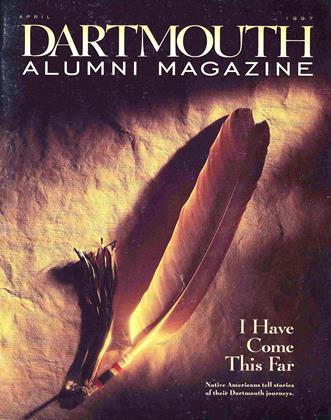My freshman winter term in 1977 was difficult. The Christmas break had allowed me to return to Louisiana to be with family and friends. That was alternately fun and scary-. My close friends were now talking about work on the oil rigs or on the boats. They had nice new cars and fairly serious girlfriends. I had no job, no car, and no girlfriend; I had a D in astronomy, had discovered how much I didn't know about Milton and Shakespeare, and had warred over symbols. My decision to go one way while the others went another began to seem illogical. I was odd-man out, and I didn't like it.
Returning to Dartmouth— a world very different from the one I had just left—complicated things even more. I felt caught somewhere in between. I again struggled with a supposedly-easy course, Psychology 1. I drew an even tighter web around the Native American House, where I spent more time. than in my own dorm. I must have been scared. Feeling and thinking that I belonged nowhere, I called home, hoping ghat someone—Mom, my brother, or my grandpa Pepere—would say, "Come home." I told my.sad tale to each of them, but it was Pe-pere who offered the most succinct, and the most unnerving, advice: "If it gets too rough," he told me, "you'll know what to do."
That's exactly what I didn't want to hear. It already felt too rough and I didn't know what to do. Moreover, I didn't want the responsibility of figuring it out. I wanted an easy, quick, painless order to return home, where all would be forgotten. I stayed up all night trying to decipher Pe-pere's message. A man of few words, he was as difficult to figure out as my professors.
I concluded, somehow, that Pe-pere's message was actually very simple: Whether I stayed or returned was up to me. It wasn't a matter of succeeding or failing, .but of assuming responsibility for my decisions. I chose to stay. My "journey," as the local paper in Houma had called it, was really beginning; now I was in charge.
Attorney N. BRUCE DLTTHU, ameviberofthe United Houma Nation of Louisiana,teaches at Vermont Law School. From 1986 to 1989 he directed Dartmouth'sNative American Program. He teaches an annual Dartmouth course on federalIndian law.
 View Full Issue
View Full Issue
More From This Issue
-
 Cover Story
Cover StoryI Have Come This Far
April 1997 By Robert A. Bennett '93 -
 Feature
FeatureNative America at Dartmouth
April 1997 By Karen Endicott -
 Cover Story
Cover StoryWhy Don't You Say Anything?"
April 1997 By Davina Begaye Two Bears '90 -
 Cover Story
Cover StoryMy Grub Box
April 1997 By Vivian Johnson '86 -
 Cover Story
Cover StoryI Dance for Me
April 1997 By Elizabeth Carey '93 -
 Cover Story
Cover StoryWe Are Not Your Indians
April 1997 By Arvo Mikkanen '83







